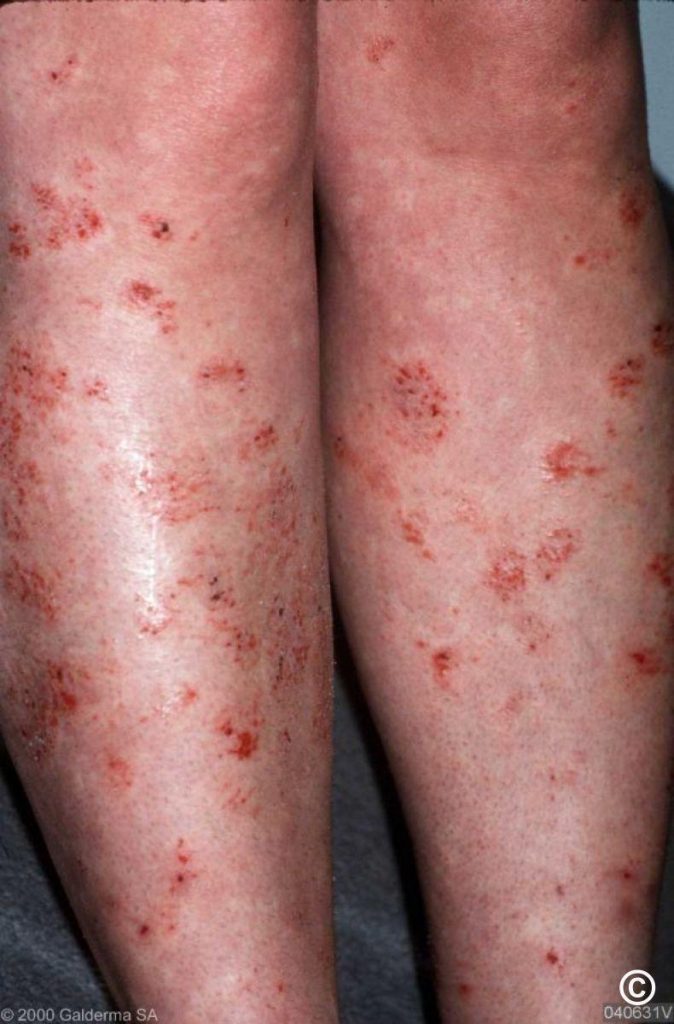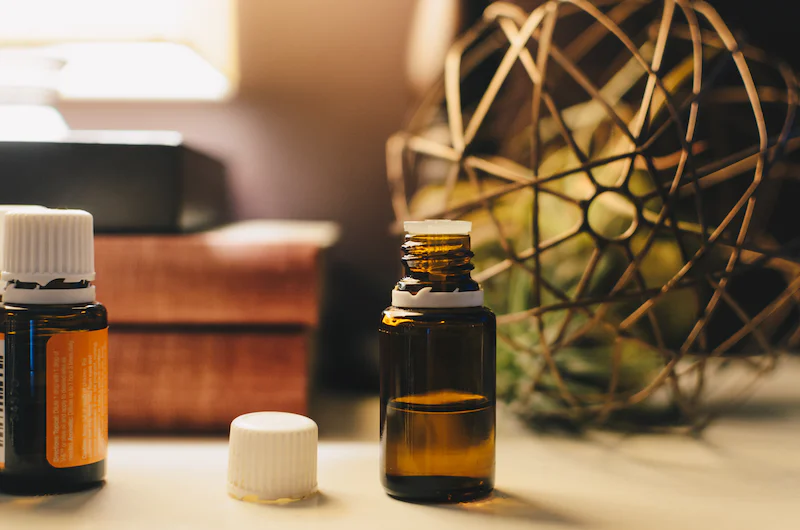I have observed in practice that often patients making inquiries at the behest of their family or acquaintances, are initially sceptical as to the efficacy of homeopathic remedies in the treatment of this chronic condition. But once their treatments begins, they are left pleasantly surprised to see a steady and progressive improvement of their condition. As the weeks progress, they not only find some level of relief from the distressing symptoms of discoid eczema but also feel a general sense of wellbeing.
Discoid eczema is an idiopathic condition and its manifestations typically include sharply defined, oval, or coin – shaped eczematous plaques. The plaques exhibit small vesicles in the early stages, and towards the later stage these become more scaly, dry and thickened. The eczematous patches are numerous but symmetrically distributed and their size ranges from 1 – 10 cm in diameter. Mild to intense itching usually accompanies the affected areas. 
Although the pathophysiology of discoid eczema is not completely understood, the known causative factors include contact allergy, environmental allergens, use of irritating and drying soap, frequent bathing with hot water, skin trauma and exposure to rougher fabrics such as wool. it is frequently associated with skin dryness which may lead to a breach of the epidermal barrier and a permeation of allergens. This form of eczema is known to exacerbate in low humidity and during winter time. Discoid eczema can sometimes be mistaken for ringworm or psoriasis.
Discoid eczema is a chronic relapsing and remitting inflammatory skin condition that can have a significant impact on one’s quality of life. Its management centres on nurturing the natural skin barriers and avoiding behaviours that can cause skin to become dry and irritated. Patients are encouraged to take short baths with lukewarm water using gentle and more natural bathing accessories. Frequently moisturising the skin using thick emollients such as petroleum jelly is usually beneficial, especially if applied immediately after having a bath whilst the skin is still wet. Patients are instructed to use loose clothing and avoid irritating fabrics.
The most common site of discoid eczema is usually the legs, but it can also appear on the torso, hands and feet. The diagnosis is usually clinically based- i.e. on sight of the characteristic round to oval plaques and dry skin. Men are prone to getting this type of eczema later in their life, while women more commonly develop it at a younger age. As with most inflammatory conditions, post inflammatory scarring of skin tissue can result from discoid eczema.
The management of discoid eczema by conventional medicine focuses on relieving symptoms and lengthening the time between flare ups. And for this, medium to high potency corticosteroids are the typical course of action, which usually leads to temporary symptomatic relief. But often it is the case that relapses are experienced not long after the steroids are stopped. However, it is a vicious circle in that the recurrent use of topical corticosteroids predisposes the patient to the risk of skin atrophy. This has lately led to an increasing number of patients of discoid eczema trying homeopathic treatment in search of a more natural and lasting relief, free from side effects.
Discoid eczema now happens to be one of the more frequently reported dermatological disorders for homeopathy patients. There is abundant clinical testimony to show the efficacy of homeopathy in treating discoid eczema and other skin conditions, making this form of alternative medicine as the “go-to” approach for a number of sufferers of this condition.
Homeopathic Remedies for Discoid Eczema
Anacardium. Intense, itchy discoid eczema with mental irritability can be treated with Anacardium. This type of eczema sometimes forms small blisters filled with a clear fluid. The skin feels worse with the application of hot water and through scratching the affected area. The patient is sensitive to cold air and is prone to feeling cold quickly.
Antimonium Crudum. This is useful for treating discoid eczema with dry, itchy skin that cracks easily and forms thick, horny calluses. The symptoms are made worse through overheating at night and also from cold bathing. The eczema forms thick, hard, honey-coloured scabs and is often associated with stomach issues. The patient is very irritable and can be offended easily. Cracking in the nostrils and the corners of mouth would doubly indicate this remedy.
 Graphites. The skin tends to be dry, rough and may secrete a thin, sticky, substance. The eczematous plaques may develop cracks and bleed easily when scratched. The skin is generally unhealthy, and even a minor injury tends to ulcerate. The patient seldom perspires and is predisposed to constipation. On the constitutional level, the patient is sad and despondent and quite inclined towards crying easily.
Graphites. The skin tends to be dry, rough and may secrete a thin, sticky, substance. The eczematous plaques may develop cracks and bleed easily when scratched. The skin is generally unhealthy, and even a minor injury tends to ulcerate. The patient seldom perspires and is predisposed to constipation. On the constitutional level, the patient is sad and despondent and quite inclined towards crying easily.
Mezereum. Discoid eczema characterised by intolerable itching, chilliness, and sensitivity to cold air may be helped by Mezereum. Itching with this type of eczema is worse at night during bedtime. Round/oval patches of discoid eczema may become raw, which are then covered with a thick crust, and pus collects under this crust. Burning and itching vesicles may show up around the edges of plaques.
Rhus Tox. This is useful for acute outbreaks of discoid eczema. The eczema has small, fluid filled eruptions. All symptoms are worse at night, in cold, damp weather, and in winter. Scratching causes an even greater need to scratch. The eczema patch tends to burn and can form a thick crust that oozes an offensive substance. The patient is restless, especially at night.
Sulphur. A very important remedy for the type of discoid eczema that feels extremely good whilst scratching. After scratching, however, the skin becomes sore and there is burning. The eczematous plaque tends to ooze if scratched too much; otherwise, the skin tends to be dry, red, and rough-looking. Contact with water aggravates the eczema symptoms and causes further burning. The patient is often sensitive to heat and is prone to skin issues.

Bio
Haroon Ashraf is a homeopath based in London, where he offers consultations in person and online. Haroon specialises in treating skin and gut conditions. Please visit his homeopathy practice at https://holistichomeopathy.co.uk/ for enquiries and appointments.
